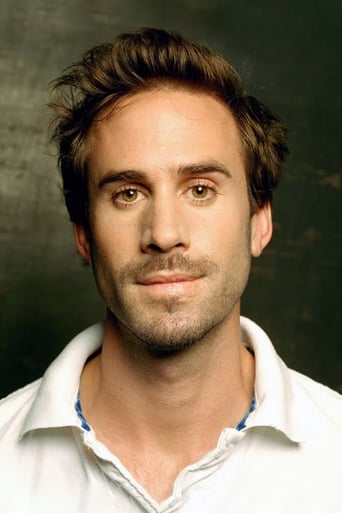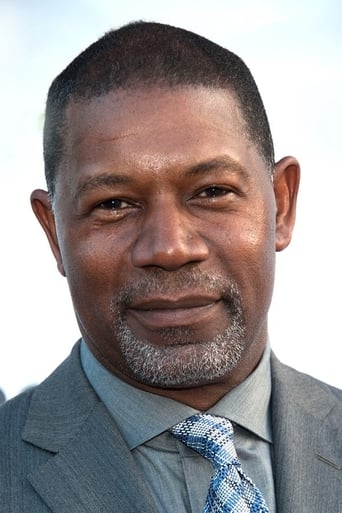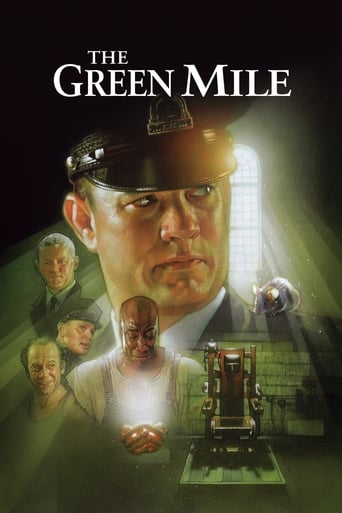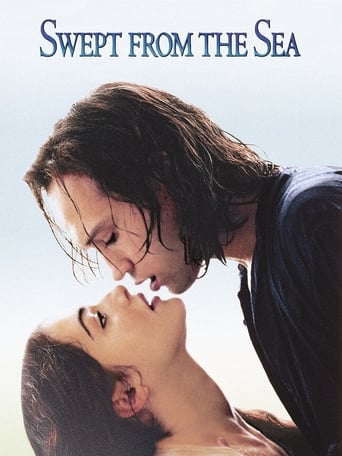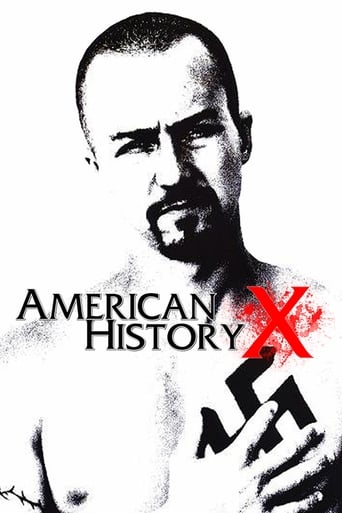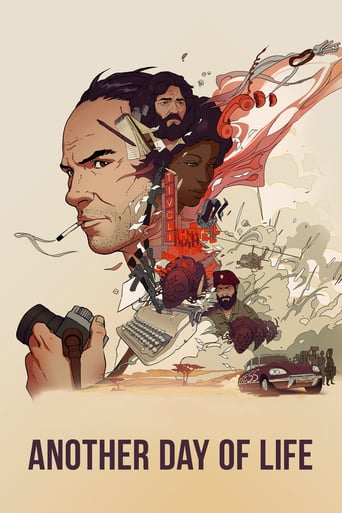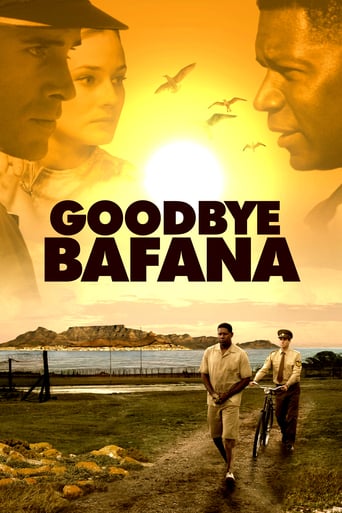
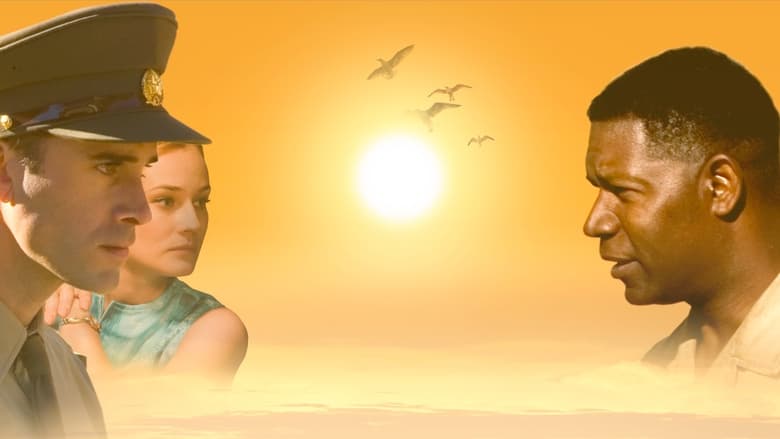
Goodbye Bafana (2007)
The true story of a white South African racist whose life was profoundly altered by the black prisoner he guarded for twenty years. The prisoner's name was Nelson Mandela.
Watch Trailer
Cast


Similar titles
Reviews
In the Color of Freedom we have Dennis Haysbert and Nelson Mandela in just the way I think of him, and Joseph Fiennes who was his guard for many years. Along the way we see what man is capable of at his best and that is the ability to see the truth when it is before him every day of his life, day after day, year after year. In the case of Color of Freedom we are expose to why Nelson Mandela was, and is, who he is. I suggest watching this movie first and the watching Invictus as a follow up as they tie together using the lines of the poem Invictus which, if only possible, should be the motto for everyone. As the movie slowly evolves you'll be exposed to much about the thinking of South Africa of the past, where as in Invictus you be expose to it in the future. I don't know if there is a movie which tells the story of Nelson Mandela's like before he was imprisoned, but there needs to be.
Nelson Mandela plays an important part in "Goodbye Bafana", but it is not a biography of Mandela. (There is, potentially, a great film to be made on that subject). Rather, it is an example of history seen through the eyes of an ordinary man who unexpectedly finds himself playing a significant role. James Gregory is a white South African prison guard. He grew up on a remote farm where his only companions of his own age were African boys, and as a result he learnt to speak fluent Xhosa. (The "Bafana" of the title was a friend of Gregory's during his childhood). This ability has made him useful to his superiors. He is transferred to Robben Island, the government's high-security prison for black political prisoners, where he is put in charge of censoring the prisoners' mail and monitoring their conversations with visitors to ensure that they do not discuss forbidden (i.e. political) topics. The film follows Gregory's career and his political development from the sixties to the end of apartheid in the early nineties. At the beginning of the film, he is portrayed as an enthusiastic supporter of the apartheid regime who believes in the superiority of the white race and who accepts racial discrimination as part of the natural order of things. As time goes on, however, his views start to change, partly as a result of the violence he sees directed by the South African police and security forces against the black population, partly because he has come to admire Mandela and the other Black political leaders. Whereas he once despised them as Communist terrorists, he now sees them as men fighting to right the injustices which their people have suffered. This shift in his political outlook makes Gregory unpopular with other white South Africans, especially his colleagues who regard him as a "kaffir lover", and even leads to strains in his marriage. Gregory's wife Gloria is more conservative than him in her unthinking support for apartheid. Her main concerns, however, are not with politics, but rather with furthering her husband's career, and cannot understand why he is putting his prospects at risk with his political stance. There is little in the way of action in this film- we hear about the "liberation struggle", but for the most part we do not see it. It is rather a film of ideas, with the most important drama being the one taking place inside Gregory's head. The problem is that Gregory's transformation from reactionary racist to enlightened liberal seems perhaps too predictable. There doubtless were white South Africans, including members of the prison service, who continued to hold unreconstructed white supremacist views up until the end of apartheid (and in some cases even beyond), but it is unlikely that a feature film would ever be made these days chronicling the life and opinions of such individuals, so we know from the outset that Gregory's views will undergo a complete change in the course of the film. Dennis Haysbert was very good in "Far from Heaven", but here as Mandela he seems less a living individual than an iconic symbol of dignity and nobility. The German actress Diane Kruger seemed miscast as Gloria. Although she seemed more at home with the English language than she did in "Troy", her accent often sounded more British than South African. (Joseph Fiennes's accent, by contrast, sounded very convincing to my non-South African ears). She also seemed too young in the latter part of the film, when Gloria is supposed to have aged nearly thirty years since the opening scenes. Despite these reservations, I enjoyed the film, mostly because of Fiennes's excellent performance as Gregory. He is a basically decent man trying to come to terms with the fact that the ideology to which he has committed himself is morally bankrupt and the political system which it supports is, in the long term, unsustainable. (Although the apartheid government had always stigmatised its opponents as "Communists", it is one of the ironies of history that in the eighties and early nineties the South African Nationalists and the Soviet Communists began to find themselves in similar positions. There must have been many basically decent Russians during the Gorbachev years who faced precisely the same dilemma as Gregory). The film's political stance may be a predictable one, and it may be telling a familiar story, but its message is one of hope and humanity. 7/10
This film, based on two very important men, is emotional and sincere but overall it is believable, every single moment is significant and told gracefully. A real life movie based is supposed to be precise without getting too much into detail - otherwise it turns boring - and so is "Goodbye Bafana", documenting 27 years in the life of this prison guard. Things and events described in the motion picture heat up gradually, the leading actors are simply outstanding so that the two hours runtime seems much shorter than it is. Haysbert is terrific, even more than Fiennes and they're both superb for their parts, with them each moment becomes increasingly more touching
Goodbye Bafana is a touching, thought-provoking movie. Extremely well acted, I loved Joseph Fiennes (James Gregory) and Dennis Haysbert (Nelson Mandela) in their roles, and Diane Kruger (Gloria Gregory) did well, too. The movie has the slow, a bit mysterious charm in it, as August's movies usually do. The color scheme was like African dust, diluted, sometimes almost raw in the scorching sun. Music supported various scenes very well, without being too prominent.The movie starts when a young prison warden James Gregory arrives to Robben Island 1968 and is addressed to keep an eye on Nelson Mandela, who is being imprisoned there for his political views. Gregory gets this mission, because he speaks xhosa, the local language, and therefore is able to read (and censor) the correspondence in and out of the prison, as well as understand what the prisoners talk to each other.James Gregory is a faithful supporter of apartheid. He believes these black men are behind bars for a good reason and he supports the government politics. After he and his family witness a raid in a busy street, where black people are randomly harassed, Gregory has to answer the questions of his children - and his explanations sounded shallow even in his own ears. Very slowly, over the years, he became to see through the apartheid and change his views.Dennis Haysbert was chosen to the role of Mandela, because of his quiet, distinctive charm and mental power. He did a great job. Joseph Fiennes was chosen because Bille August wanted an actor, who was tough and yet sensitive, someone who would be able to portray the change in the character in a period of almost thirty years. It was a very challenging role but Joe did a marvelous job.There has been a lot of talk about his South African accent, and mostly it has been praised. I followed it very closely, and I think Joe did fine in that area, too. In some scenes the British accent is more or less audible, but most of the time he does a wonderful job.Diane Kruger did a good job as James's wife, a mother of two, who was also raising their kids to support the apartheid. She opposed her husband being a warden for Nelson Mandela, because she could see that the close contact with the inmate made cracks to James's shield and his racistic opinions were vanishing rapidly. She tried to hold onto the apartheid views for much longer than her husband.The movie ends to a year 1990, when Nelson Mandela is released from prison after being incarcerated for 27 years. The era of the new South Africa was to begin.


